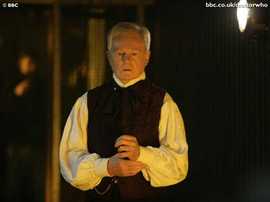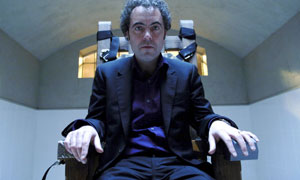Reaction shots
Mon. June 18, 2007Categories: Abstract Dynamics
 |  |
Last week, Lawrence Miles wrote of Steven Moffat’s overrated Dr Who episode from the last series, ‘The Girl in the Fireplace’ that it ‘as if the author’s so desperate to write about the tragic consequences of the love affair that he hasn’t bothered figuring out how the characters might actually fall in love to begin with.’ Miles, as so often, has identified one of the defining pathologies afflicting postmodern entertainment in Britain: premature emotional ejaculation.
Case in point: the ghastly, grand guignol grotesquerie of Britain’s Got Talent, a programme that tells you far more about the current state of British popular culture than the tired Big Brother (is anyone watching this year?) What is interesting about Britain’s Got Talent is the way in which it distils current TV conventions to the point of being indistinguishable from an Armando Ianucci parody. The acts vary in quality from the watchably appalling (a midget-in-a-handbag routine, for instance was almost Lynchian) to the unwatchably mediocre – but, no matter, because the show is not about them, it is about the ’emotional journey’, which we are led through in three stages that years of X-Factor and Pop Idol have second naturalized. First, we have the back story – in which, with no crass emotional trigger left unhammered – we are fed the tragic conditions that are being overcome, the illnesses fought against, the griefs bravely faced; then, there’s the performance itself, often so boring and inconsequent that Ant and Dec have to be shown at the side of the stage cavorting and mugging in order to maintain flagging interest; and thirdly – the real point of it all – the emotional ejaculation, the looks of triumph and disaster over which the camera pores in cloying slo-mo, while ‘I can be your hero baby’ or ‘here, there, there’s nothing to fear’ or some other hyper-hackneyed sentimentalist anthem belts out. In the past, I’ve been tempted to call this ’emotional pornography’ but, by comparison with the obscene speed of TV’s tear jerk-offs, porn-time is almost quaint in its patient distention. In porn, it takes twenty odd minutes before you get the money shot; but the kistch sturm-und-drang reaction shot arrives in under three. It’s pretty clear that the competition is not about the acts at all, but which back story is most mawkishly exploitable. A lisping six year old – who reminds me of the child talent competition in the last series of League of Gentleman (‘Cherry Bakewell is chair of the judges? Good, good’) – was the tabloid favourite.
Even quizzes are now required to adhere to this tripartate structure. As, naturally, is Drama. Which brings us back to Dr Who. Saturday’s episode was an ultra high speed tour through the conventions of current TV: it was so fast-paced it felt like a simulation of a series of neurological spasms. At the same time, it felt bizarrely contentless – you are being hectored through at such a rate, that you do not feel that you are actually watching the programme itself. Jameson has said that the trailer is the form most with late capitalism, and, like much TV now, Dr Who feels like a trailer for itself, an impression reinforced by Murray Gold’s awful bombastic orchestral score. Gold’s music – produced to the order of Russell T Davies, who insisted that the show needed a ‘Hollywood’ score – is both formally and texturally inapt (it could be shipped in from any action film whatsoever) and emotionally redundant, (screaming at us what to feel, in case the emotional manipulations of the script aren’t bludgeoning enough). Neurotic hucksterism (cynicism) and sentimentalism (piety) become indistinguishable, just as they are in advertising, whose logic and form, as Baudrillard long ago predicted, has infected all TV now. Every time David Tennant goes into his nauseating paean to ‘indominatable ‘uuuumans, gor blimey, ain’t they marvellous, surviving ‘ere at the end of the yewwwniverse, god bless ’em’, I think of commercials for BUPA.
The twitchy urge to keep selling us what we are about to see, the fear of slowing down for one minute, the designing of every feature of programming to fit some focus-grouped demographic specification, is a consequence of what Owen has called the BBC’s failure to be the BBC. Since there is no ‘public’ to service any longer, the BBC justifies itself by its pursuit of market share. Defenders of capitalism will argue that it delivers diversity, yet a quick survey of the relentless monotony of TV quickly gives the lie to that illusion. Hedonic conservatism goes hand in hand with retrospective impossibilization. It has now become impossible to imagine something that was, in fact, once the case: a teatime television show that used experimental electronic music. This , we are told, cannot happen any more – but is there more to this than the self-fulfilling prophecy of TV execs, or is it, terrifyingly, indicative of a terminal, irreversible condition?
Last night, as with Human Nature/ Family of Blood two weeks ago, there were flashes of the old Who. I must confess to have had gooseflesh and a tear in my eye when Derek Jacobi proclaimed, ‘I…am…. the Master…’ It was as if Russell Davies, who has been maliciously melting our childhood toys down into PoMo gloop on the pyre of capitalist realism, miraculously relented and gave us one back. But, quick as a CGI flash, it was snatched away again, as Jacobi was regenerated into the capering and japing John Simm (the most overrated actor on British TV), and normal service was resumed.
It’s unfair to judge Simm on the basis of the three or so – albeit dreadful – minutes he had in the role last night. Perhaps he’ll seem less like the Riddler in the next two episodes. But even if he doesn’t turn out to be Tennant-but-EVIL (and my bet is that the Master will have boned up on his 21C popcult references by the time we see him in the next installment, ready to trade Harry Potter references with his adversary), my problem with Simm is much like my problem with Tennant. It’s physical. Simm is too baby-faced toothsome to play The Master. Like Tennant, he doesn’t look weird enough. Watching Tennant and Simm, I am constantly made aware that these aren’t Doctor Who and the Master, they are actors playing Doctor Who and the Master. With the classic Doctors, from Hartnell to Tom Baker, the face and hair were three quarters of the character. Hartnell, Troughton, Pertwee and Baker were character actors, not leading men, and they had faces – interesting faces – to match. But in today’s TV, with its age and looks apartheid, there is little place for anyone whose face is unusual, or over fifty.
It’s not as if the Master in the original series was anything other than a standard melodrama turn. But something about the physical presence of Roger Delgado gave the cartoon menace an edge. With Simm, it looks like we’re going to get the usual postmodern wisecracking mad-as-a-box-of-frogs hyperactive model of evil. The problem is that this is not a convincing – or interesting – picture of either madness or evil. (When did this tedious version of madness and evil begin? I’m afraid that the ‘Here’s Johnny’ moment in The Shining was probably pivotal; and another moment of Nicholson self-regarding contempt for the audience, his Joker in Burton’s dreadful Batman, pretty much established all of the conventions of PoMo mad evil. Hopkins’ hamtomime Lecter is another key moment in this genealogy, of course.)
One effect of capitalist realism is de-mythologization: it seems that the failure to envisage alternative political or social systems has also corroded the ability to imagine monstrosities. The poverty of teratological innovation has been evident in film and TV SF for the last twenty five years (China might think about consulting his lawyers about the insect headed woman in this weeks Who, though). But psychological monstrosity has been equally badly elaborated. The BBC’s Jekyll, whose first episode was broadcast last night, was another example of this imaginative failure. The hole at the centre of the programme was James Nesbitt’s Hyde. Nesbitt used the same pleased-with-himself, I’m made, me style Simm had used earlier in the evening (I should point out here that Jekyll was scripted by Steven Moffat). But smugness is not menacing. It’s just irritating.
* ‘Vintage’ Dr Who was mocked on arch-smugonaut Angus Deayton’s dreadful new panel show last night. I switched over just after Deayton turned out a received idiocy about classic Who having the ‘budget of a village pantomime but with worse production values’. Deayton is so ontologically smug that it’s impossible to imagine that punchable smirk wiped off his face in any circumstances whatsoever. After tabloid revelationsa few years ago that would have caused anyone else to head for an arctic Fortress of Solitude, Deayton returned, smug as ever, as indefatigable as Michael Myers. Would anything stop him being smug? Pulling his fingernails out one by one, maybe… Well, we could have a go…